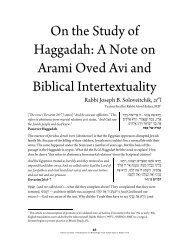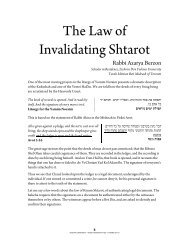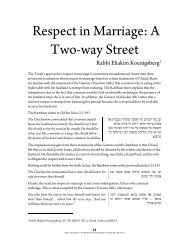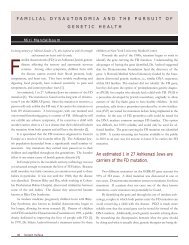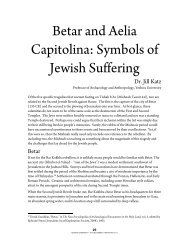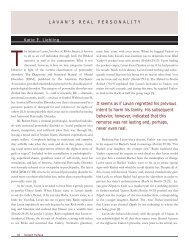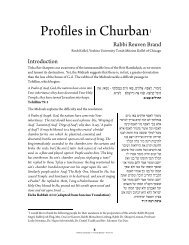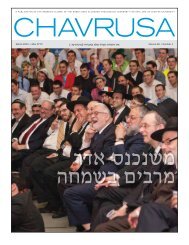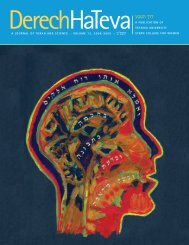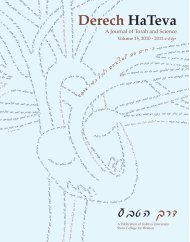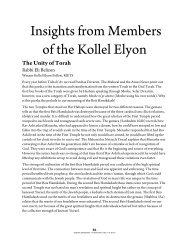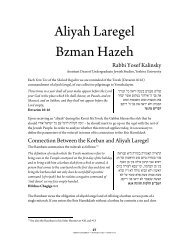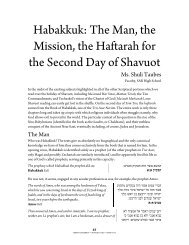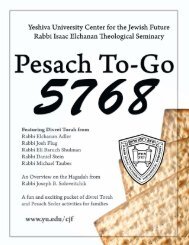YESHIVA UNIVERSITY • SUKKOT TO-GO ... - YU Torah Online
YESHIVA UNIVERSITY • SUKKOT TO-GO ... - YU Torah Online
YESHIVA UNIVERSITY • SUKKOT TO-GO ... - YU Torah Online
You also want an ePaper? Increase the reach of your titles
YUMPU automatically turns print PDFs into web optimized ePapers that Google loves.
This can be understood on a deeper level when one takes into account the Rambam’s definitions<br />
of the “angel” and the “prophet.” 40 According to the Rambam, angels do not exist as celestial<br />
beings at all; they are incorporeal or “intelligences without matter.” 41 More simply, an “angel” is<br />
the way in which we refer to the will of God to change something in this world. The term “ךאלמ”<br />
is essentially a metaphor for Divine Providence. When God sends forth a “force” to put His will<br />
into effect, that force is an “angel.” 42 It is God’s will, something incorporeal, taking place in and<br />
acting upon the world of nature and physicality. Compare this to the Rambam’s definition of the<br />
prophet. A prophet is someone who achieves a level of intellectual and imaginative perfection<br />
that is so elevated, that he can begin to reach an “understanding” of God. In other words, a<br />
prophet is a man of flesh and blood, of the natural world, who is able to ascend to God and<br />
“touch” the heavens. 43 Herein lies the intrinsic similarity: the angel and the prophet are both<br />
representative of a bridging of the gap between the Heavens and the Earth. They differ on<br />
the point of departure. One is the Heavens itself reaching downward to change our earthly<br />
reality and one is a material human being who “touches” the Heavens.<br />
The Rambam’s definitions now become the key to our understanding of Moshe Rabbeinu.<br />
Moshe was the greatest prophet who ever lived. 44 The aggadot raise him to the status of an angel.<br />
By doing so, they are adding to his exalted prophetic status. What these aggadot are depicting for<br />
us is that in his journey to fulfill the role of prophet, he played into the role of an angel by<br />
effectively fulfilling a mission for God. After all, the corporeal world was forever changed by the<br />
nation he liberated, the <strong>Torah</strong> he introduced to them and the forty-year journey he led them on.<br />
While the prophet is on a level in which he can offer the possibility of change; the angel is<br />
change itself. The prophet is the impetus for an act; the angel accomplishes the act itself.<br />
Moshe Rabbeinu was both. The descriptions of Moshe as “angelic” are not mere accolades or<br />
just testaments to his status as a holy, righteous person. 45 They are a description of the very<br />
unique spiritual footprint he left on this physical world, on how the gap between heaven and<br />
earth was bridged in his time.<br />
Rav Soloveitchik describes Moshe’s personhood using a very similar analysis. In The Emergence<br />
of Ethical Man, in discussing the different classifications of prophets, he states that Moshe is<br />
unique in that he “…introduces a new motif into the God-man fellowship, namely that of<br />
shelihut - agency. He becomes the divine angel who acts on behalf of God and represents Him.<br />
40 The Rambam discusses the nature of the prophet in Moreh Nevuchim II:32 and in Hilchot Yesodei Hatorah 7.<br />
41 Moreh Nevuchim I:49 – angels can appear as physical forms in a vision, but they are not, in reality, physical<br />
beings. In the Moreh II:6, the Rambam elaborates on the idea of angels as Godly “forces”, like the forces of nature,<br />
for example.<br />
42 For instance, the Rambam explains that images of angels “flying” or possessing wings, are allusions to a mission<br />
being set into motion or happening quickly. (Moreh Nevuchim 2:4)<br />
43 And is, therefore, able to help humanity to understand God’s will.<br />
44 According to the Rambam in Hilchot Yesodei Hatorah 7:6, part of Moshe’s uniqueness as a prophet was in his<br />
ability to comprehend his prophecies not only while awake and with absolute clarity, but as if he was a “friend” or<br />
“confidant” of God; i.e. without fear and at any time.<br />
45 By the Rambam’s definition of the angel as a force, and not a formed celestial being, they are certainly not<br />
theologically problematic descriptions either.<br />
32<br />
<strong>YESHIVA</strong> <strong>UNIVERSITY</strong> <strong>•</strong> <strong>SUKKOT</strong> <strong>TO</strong>-<strong>GO</strong> <strong>•</strong> TISHREI 5771



